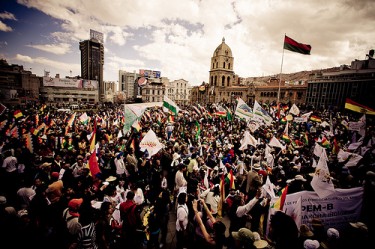
A proposed road project in Bolivia that plans to cross right through the middle of Indigenous Territory and National Park Isiboro Sécure (TIPNIS) is once again generating conflict and protest. Indigenous organizations, TIPNIS inhabitants and their supporters began a new long march on April 27, 2012 from Trinidad to La Paz demanding an end to the road project.
Plans for the 306 kilometer road are the result of an $415 million agreement signed by the Presidents of Bolivia and Brazil in August 2009. The Brazilian company OAS was initially awarded a turnkey contract to build the road in 40 months with financing from the Brazilian National Bank for Economic and Social Development (BNDES).
In October 2011, after a large march of indigenous peoples and protestors arrived in La Paz, President Evo Morales passed a bill declaring the TIPNIS “intangible” or “untouchable”, which was understood by environmental campaigners and indigenous organizations as the final word on the issue.
However, in February 2012 Bolivia’s government gathered pro-road supporters and supported a different march that proposed a new law calling for “prior consultation” that would allow indigenous peoples a greater say. Indigenous inhabitants of the TIPNIS – supported by the Confederation of Indigenous Peoples of Bolivia (CIDOB) claim that such constitutional mechanisms should have been conducted before any agreement or contract was signed. Morales eventually announced the cancellation of the contract for the road with the Brazilian company OAS at the beginning of April, but protestors still reject the terms and conditions of the proposed consultation.
A large number of indigenous organizations and citizens acknowledge that Evo Morales – an indigenous and coca grower’s leader himself – has improved their situation. Still, indigenous organizations emphasize that their protest is about their right to be consulted before policies concerning their territories are implemented.
This video shows interviews with indigenous TIPNIS residents and their views on the road project.
The environmental impact of the road is another issue sparking protests, particularly among Bolivia’s urban and middle classes.
Nevertheless, Bolivia’s government insists on the benefits of a road that would link the central zone of the country, beginning from where most illegal coca is produced and where Evo Morales garners grassroots support. Coca-grower organizations are openly supporting the road as it may provide opportunities to expand production into the TIPNIS National Park. Inevitably, this generates further suspicion among environmentalists, international organizations and public opinion.
Debates also continue on social media platforms, particularly on Twitter (under the hashtag #TIPNIS). One of the questions simply asks “are you in favor or against the road #TIPNIS?”
Among the replies was:
“I think the country must be integrated, if [it] is…best to go through the TIPNIS, so be it, the road should go through where is the best for Bolivia.”
Criticisms are also leveled at the relationship between the road project and the Brazilian-supported Initiative for the Integration of Regional Infrastructure in South America (IIRSA), a development plan to link South America’s economies through new energy, transportation and telecommunication projects.
According to researcher Gustavo Soto’s post on the CEADESC blog:
“The 2010-2015 MAS (Evo Morales’ political party) program aligns the Bolivian economy to the emerging global capitalist interests of the 21st Century…expressed in mega-energy…road and extractive projects mostly encapsulated in the IIRSA II that inevitably lead to the violation of indigenous rights.”
For further information on the topic, please view the following publications from our partners:
The Politics of Evo Morales’ Rise to Power in Bolivia: The Role of Social Movements and Think Tanks, from the Overseas Development Institute.
Natural Gas, Indigenous Mobilization and the Bolivian State, from the United Nations Research Institute for Social Development.
And for a more general view on the political changes on Bolivia and Latin America, please check the following publication: Postliberal Democracy Emerging? A Conceptual Proposal and the Case of Bolivia, from the Peace Research Institute Frankfurt.
For more information on issues and events that shape our world please visit the ISN’s Security Watch and Editorial Plan.

